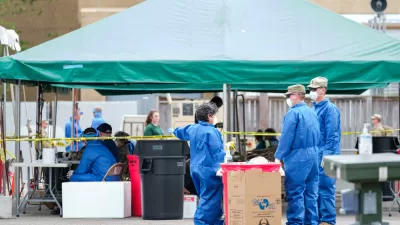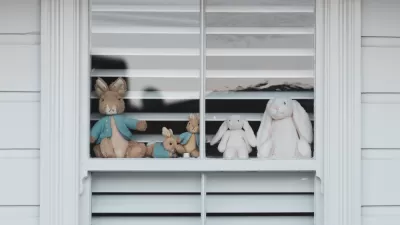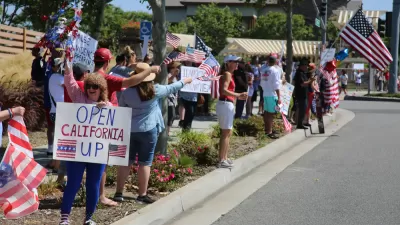The governors of Arizona, California, Florida, Texas, and other states where COVID-19 infections are threatening to overwhelm hospitals should consider what their counterpart in Victoria, Australia, did on July 7 to contain the coronavirus.

"Metropolitan Melbourne will go into stage three lockdown for six weeks from 11.59pm on Wednesday [July 8] after the state [Victoria] recorded 191 new cases of coronavirus since Monday, the highest daily increase since the pandemic began," reported Josh Taylor and Melissa Davey for The Guardian on July 7.
The Victorian premier, Daniel Andrews, announced that people living in the Melbourne metropolitan area and Mitchell shire would again be subject to restrictions, meaning they can only leave their house for work, education, exercise, for necessary goods or services or for medical or compassionate reasons until 11.59pm on Wednesday 19 August.
Only 191 daily cases in Victoria, a state with over 6.6 million people, necessitate a shutdown? By contrast, look at the cases recorded by Worldometer on July 8 in U.S. states where the coronavirus is surging:
- Texas: 10,199
- Florida: 9,989
- California: 8,561
- Arizona: 3,520
Leadership
Andrews announced the return to stay-at-home restrictions on July 7. He "cited the rapid rise in cases in Melbourne and said it was unsustainable to keep the current restrictions in place," add Davey and Taylor.
“These are unsustainably high numbers of new cases, he said. “It is simply impossible with case rates at this level to have enough contact tracing staff, to have enough physical resources, no matter where they come from, no matter what uniform they wear, in order to continue to suppress and contain this virus without taking significant steps."
What about the U.S.?
"I think any state that is having a serious problem, that state should seriously look at shutting down," said Anthony S. Fauci, the nation’s top infectious-disease official, in a Wall Street Journal podcast on Wednesday.
He softened his tone on Thursday, telling The Hill's Steve Clemons, "Rather than think in terms of reverting back down to a complete shutdown, I would think we need to get the states pausing in their opening process." CNN also reported on the interview:
"Not to be hyperbolic about it -- it really is the perfect storm and (an) infectious disease and public health person's worst nightmare. It's a spectacularly transmissible virus," he said. "The efficiency with which this transmits is really striking."
Four states that account for about 50% of new infections -- Arizona, California, Florida and Texas -- need to aggressively keep people socially distanced, including by closing bars and preventing crowds, he said.
Another health expert echoed Fauci's initial comment about second shutdowns.
"If you're not doing the ... things we've talked about in the past to get this outbreak under control, starting with test and trace ... your only option is to shut down," Dr. Ali Khan, former director of the CDC's public health preparedness office, told CNN's "New Day" Thursday.
U.S is not Australia
Comparing states in America with states in Australia is not a fair comparison in the age of COVID-19. Australia is a coronavirus success story, in a league with its neighbor, New Zealand. To date, 106 people have died from the virus, the same rate, 4 per million, as New Zealand, according to Worldometer. Over 135,000 Americans have died from COVID-19, a rate of 410 per million.
A final note on the so-called lockdown in Melbourne: it's not. It's a stay-at-home order that includes a shutdown of nonessential businesses, very similar to what all but eight governors in the U.S. issued in March and April during the first surge of the pandemic. Residents can leave their homes for shopping and exercise without documentation just as they did in the U.S.
Related in Planetizen:
-
Coronavirus Success Stories [New Zealand], June 8, 2020
-
What Can Vancouver Teach Melbourne? November 23, 2014
-
How Jan Gehl Turned Melbourne into a Pedestrian Paradise, June 24, 2013
FULL STORY: Coronavirus Australia: Melbourne in six-week lockdown after Victoria records 191 new cases

Alabama: Trump Terminates Settlements for Black Communities Harmed By Raw Sewage
Trump deemed the landmark civil rights agreement “illegal DEI and environmental justice policy.”

Study: Maui’s Plan to Convert Vacation Rentals to Long-Term Housing Could Cause Nearly $1 Billion Economic Loss
The plan would reduce visitor accommodation by 25% resulting in 1,900 jobs lost.

Planetizen Federal Action Tracker
A weekly monitor of how Trump’s orders and actions are impacting planners and planning in America.

Wind Energy on the Rise Despite Federal Policy Reversal
The Trump administration is revoking federal support for renewable energy, but demand for new projects continues unabated.

Passengers Flock to Caltrain After Electrification
The new electric trains are running faster and more reliably, leading to strong ridership growth on the Bay Area rail system.

Texas Churches Rally Behind ‘Yes in God’s Back Yard’ Legislation
Religious leaders want the state to reduce zoning regulations to streamline leasing church-owned land to housing developers.
Urban Design for Planners 1: Software Tools
This six-course series explores essential urban design concepts using open source software and equips planners with the tools they need to participate fully in the urban design process.
Planning for Universal Design
Learn the tools for implementing Universal Design in planning regulations.
Caltrans
Smith Gee Studio
Institute for Housing and Urban Development Studies (IHS)
City of Grandview
Harvard GSD Executive Education
Toledo-Lucas County Plan Commissions
Salt Lake City
NYU Wagner Graduate School of Public Service





























